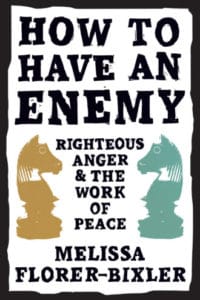 How to Have an Enemy: Righteous Anger & The Work of Peace by Rev. Melissa Florer-Bixler is a sermon. Like a good sermon it encourages skepticism and ensures discomfort.
How to Have an Enemy: Righteous Anger & The Work of Peace by Rev. Melissa Florer-Bixler is a sermon. Like a good sermon it encourages skepticism and ensures discomfort.
As an elder-Millennial like me might say, this sermon teaches listeners “how to enemy.” We have tried to raise our children with similar instructions on when anger and hate are appropriate and when they are not.
When we were young, we were prohibited from hating things. It’s not a bad rule, but not always accurate or helpful. Some things really should be hated, and we want our children to be passionately opposed to those things. But, just like casual swearing, we do not want to hear them lazily respond to every slight discomfort with hate.
This is exactly what Jesus spent time doing. He taught his followers what to hate. Just like the prophets of the Old Testament before him, Jesus hated religious authorities creating barriers to faith and purity cultures bent on sustaining religio-political hierarchies. We may say that their passion for doing good was laudable, but the way they did it was not.
So, full disclosure, I was sold from the beginning, even before I received a free review copy.
Rev. Florer-Bixler and I actually received the same training at turn-of-the-millennium Gordon College (Wenham, MA). At the time, there was still a free-standing sociology and social work department, and Prof. Marv Wilson was still teaching full-time and requiring his students to read Abraham Joshua Heschel.
When we learned that the Jesus of the New Testament knew no other scripture than the wisdom and prophetic traditions of the Old Testament, we were being asked to understand that Jesus’ indictments against false religion were no different from Isaiah’s or Jeremiah’s. We were learning to be suspicious of Jesus as a messiah of world-dominating, empire Christianity, and of Christianity as a religion with answers to defend.
We were learning that Jesus did not start something new, but fulfills that longstanding Genesis 12:3 promise that “all families on earth would be blessed.” We were learning to cultivate a theological reflection of turning texts over and over to see their present meaning, while we were unlearning intellectual dominance where theology rules every and any other discipline.
This book-sermon explains from the outset that the work of the kingdom of Jesus is real and present reconciliation: Tanner’s “essentially relational” and unconquering faith; Cone’s “liberation,” because “there is no ‘outside’ from the power of destruction and death at work in the church”; Crenshaw’s call to “dismantle” intersecting oppressions; and Garza’s call to end the “state violence” against Black lives. And yet, Dula’s notion of an “occasional church” suggests that this kingdom is not guaranteed so much as it is lived.
For the author-preacher, the church does not hang by the threads of false unities disconnected from the suffering of economic, racial, and gender minorities and the public policies supporting such disenfranchisement, but only exists to the extent that it rips “out the systems of death and destruction that dominate our lives.”
I also went to seminary. During my time there I realized how many more questions I ought to be asking about my own vocation and about the universality of Jesus’ message. How to Have an Enemy felt like a continuation of this important, lifelong journey of self-inquiry, because I was quickly disabused of any remaining sense that theology is a comfortable discipline designed to keep me feeling both good about myself and good before God.
This sermon also reminded me that theology is not, and never was, a program of self-inquiry. My sense is that communities of justice, faith-based or otherwise, cannot exist while they remain cemented into their mutually exclusive certainties. I do not know how I can personally get out of a posture of entrenchment, and I do not know how communities can do so without learning the art of asking good questions. This sermon is powerful because it asks us to ask good questions, and it asks us to step away from the myth that enmity is an issue “solely between individuals, rather than dependent upon systemic and coercive power.”
There are some practical side effects to this shift in thinking.
For one, politics become necessary. During the COVID-19 pandemic a majority of the American population experienced what it is like to have their daily lives affected by public policies. It is no secret that economic access leads to greater freedom. I therefore assume most of white middle- and upper-class America is basically free to do as they see fit, because that’s how our system of laws are designed. If you disagree that different Americans experience America differently, I would encourage you to discuss your position with someone who is Black, Latinx, Asian or indigenous, identifies as a woman or LGBTQAI+, has a relative in prison, or who has been forced to depend on food stamps or subsidized healthcare through Medicaid.
When we realize that there are large swaths of our national community whose lives are not affirmed in our laws, which permit state violence, underpayment, over-incarceration, and endless red tape — rather than promoting a free, just, and healthy society — I think it helps us realize that political engagement is not just a privilege we can dismiss with feel-good comments like, “we can be one in Christ even if we vote differently.”
Instead, public policy and the politics controlling it are necessary. Public policy and politics, for those without access or experiencing bias and abuse, are not just a difference of beliefs, because public policy and politics are about power. Rev. Florer-Bixler says it well:
“When there are enemies, one is in power over the other, or there is a conflict over who holds power… Until we are willing to name, assess, and address power — how we come to the church in bodies that bear within them legacies of power brokering, centering, and divestment — our Christian unity is little more than a strategy to maintain the status quo and avoid conflict.”
The sermon does not stop there.
When the gospel is no longer used to host a watered-down, policy-less space so Democratic and Republican parishioners both keep writing tithe checks, it becomes what it always was. The gospel is a source of anger at injustice, a source of present hope, and a source of blessing (cf. Matthew Fox, Original Blessing). So it is more than appropriate that this sermon includes an entire chapter on anger, not to stoke partisanism but to strengthen the faith community with a tool for “scorching clarity.”
And this work is never done.
Reading this sermon, I was left with the distinct impression that having an enemy was a form of prophetic seeing. How I see Jesus is how I understand my enemy. The work of becoming angry at the right things, and hating the right things is a life of discernment, “one that shifts and changes, loops back on itself, where we must fail and repent and try again.” This lived theological process, found in “the places of suffering,” feels like the “Jeremy Bearimy” Jesus meant for the church.
The greatest overlap between this sermon and my own research came towards the end, in the chapter on becoming an “enemy of Mammon.” “Charitable giving based off the personal preferences of those who have benefited from the economic systems of whiteness will not achieve Jesus’ mission of redemption.”
I see the current federal estate tax unlimited charitable deduction for ultra high net worth individuals in a similar way. “When many Americans are struggling, it is highly imprudent to privilege the subjective, preferential giving habits of even generous wealthy decedents, with a public subsidy as high as the unlimited charitable deduction” [M.R. Groff, Keeping America: Keeping America: Wealth concentration and the Need for Repaired Revenues and Basic Income. 34 Quinnipiac Probate Law Journal 4, 385 (2021)].
In this way, individual charitable giving is not the “help” we are looking for. What we need is structural reform obviating the need for such poverty in the first place. I appreciated this sermon’s clear discussion of the way economic empires contribute to the compounded poverty of racial minorities, and the sermon provides important examples of how unjust fiscal policies and implementations intersect with the church’s work.
After all, Jesus rejected systems of economic disparity in ancient Rome and such wealth inequality is just as incompatible with Christian faith today.
Personally, I have needed mentors as I attempt to live such faith today.
At the beginning of 2021, I started reading James Baldwin’s collected essays. He wrote to the world he presently lived in with the energy of a beat reporter, but with the insight and wisdom of history, as if reflecting decades in the future with the benefit of hindsight.
For Baldwin, America is racist and white people perpetuate this racism. Baldwin speaks this clearly because he is unswervingly dedicated to the future, almost as if he thinks it is possible. He wants a reconciled country that has worked through its problematic racist history. In his (and this sermon’s) estimation, this is only possible together. Our futures are bound up in each other. “The price of the liberation of the white people is the liberation of the Blacks — the total liberation, in the cities, in the towns, before the law, and in the mind.”
I need strong sermons and passionate preachers like Rev. Florer-Bixler because, by default, I prefer to be comfortable. I need Flannery O’Connor’s “large and startling figures” to jar me awake from my sleepy existence in a world designed just for me. If you come away saying “I didn’t agree with any of that,” I think you missed the point of this sermon—and maybe preaching in general. Sermons are not delivered for agreement or disagreement based on where we were before receiving them.
Remember, a good sermon encourages skepticism and ensures discomfort. It is meant to challenge and change us, to help us reflect, and “bless all families on earth.”
 Ryan Groff is a Massachusetts attorney and writer. He is a board member at the Heathmere Center for Cultural Engagement, Inc., a nonprofit strengthening communities through dialogue and the arts, and a member of an independent federal advisory committee improving taxpayer experience at the IRS. Ryan holds advanced degrees in law and theology with honors, and is a former college teacher and higher education administrator. He lives north of Boston with his wife and their four children.
Ryan Groff is a Massachusetts attorney and writer. He is a board member at the Heathmere Center for Cultural Engagement, Inc., a nonprofit strengthening communities through dialogue and the arts, and a member of an independent federal advisory committee improving taxpayer experience at the IRS. Ryan holds advanced degrees in law and theology with honors, and is a former college teacher and higher education administrator. He lives north of Boston with his wife and their four children.

